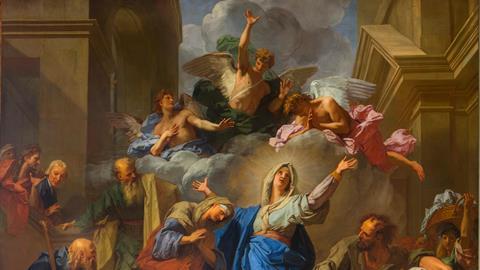Elaine Storkey unpacks one of the most powerful and often-repeated passages in the Bible, which came from the lips of a young woman
Study passage: Luke 1:39-56
I love the way every generation of Christians produces its own music for worship. We have been greatly blessed over the last few decades by the outpouring of inspired songwriters who have brought their deep faith in God into their music. It’s wonderful also to sing the songs of the generations before us and be drawn into their faith. One particular song, derived from Luke’s Gospel, has been sung from the earliest centuries of Christian worship. It was sung in Latin by nuns and monks, and in different languages across many denominations down through the ages. World-renowned composers like JS Bach, Vivaldi and Mozart have set it to music in their own style and artistry. Some churches still sing it each week; in some communities it is even sung every evening. Apart from the Lord’s prayer, it is probably the passage in the New Testament which has been recited more than any other. And it comes from the lips of a young, pregnant woman. I’m talking, of course, about Mary’s song, the ‘Magnificat’.
The context behind the song
What is it about this song that has captured the imagination of believers right through the centuries? First is the narrative context. Living in a land occupied by an imperial power, a teenage woman had just had a visit from an angel. She had been told that she was going to bear a child who would be the Son of God. Stunned and bewildered, she accepted the angel’s message and set off to see her elderly cousin, who, she was told, was also pregnant. The visit was a sharing of vulnerability.
Mary, unmarried, a virgin, but now expecting a child, would inevitably have been apprehensive about ostracism and rejection from others. Elizabeth, old and formerly barren, had to cope with neighbours’ attitudes and changes in her body; she wouldn’t have been expecting fertility in old age. Each needed the other in her different struggles. The meeting of these two cousins, each experiencing her own miracle of conception, was rich in symbolic meaning. The baby in Elizabeth’s womb jumped for joy as Mary entered her home, carrying the foetus who would change history. And the outpouring of God’s praise flowing from each cousin became a powerful testimony to their anointing by the Holy Spirit.
The message contained in the song
The second thing that has captured imagination is the song itself. The words open up a window on our awareness, and are crucial in helping us to understand God better. Each phrase in Mary’s song challenges us. She sang about a God who forcefully reverses the values held by most cultures of the world and replaces them by values and people often despised and rejected. God reverses status – he scatters the proud and all their plans, while engaging with a girl of no prestige or standing, and uses her in his divine plan. God reverses power – he pulls rulers down from their thrones and lifts up the meek and ordinary people instead. God reverses economics – he makes sure the hungry are well fed while sending the rich away empty-handed. God even reverses national importance: Rome, the mighty imperial power of that era doesn’t get a mention, yet the small nation of Israel is honoured and promised God’s care and mercy.
Each phrase in Mary’s song challenges us
It’s not surprising, therefore, that the Magnificat has been seen by those under oppression as a song of liberation. Christians in many nations have identified with the humble nobodies that God seeks to bless and seen the song as their manifesto to reach out to the hungry and dispossessed of their own generation. This has not gone unnoticed; its political force has been frequently recognised by autocratic regimes who have feared its impact. In the 1970s in Argentina, a group called the Mothers of the Disappeared used Mary’s song to call for nonviolent resistance to those in power. In the face of the vicious elimination of their own dissident sons and daughters, they displayed the words of the Magnificat on posters and placards throughout the capital’s plaza. The swift response of the ruthless ruling military junta was to eliminate the subversive message. In an official clampdown, they banned the Magnificat from being displayed or spoken in public. A few years later, Guatemala’s government imposed a similar restraint when it was used by their critics. Christians might not always recognise the power of Mary’s song in the Bible, but tyrants do.
Yet, a paradox exists at the heart of the Magnificat. For Mary’s song describes a time of peace, hope and joy. In God’s reversal, the dictators no longer rule by military might, the rich no longer pay the poor less than they need to live on, the self-important no longer take advantage of those with no bargaining power. Yet this was not the world Mary knew, and it is not the world we know today. If anything, more power is concentrated now in fewer hands, and oligarchs across the world impose tariffs, refuse aid, create wars and treat weaker nations seemingly as they wish. So is this song a failure: simply wishful thinking by women who will always be on the margins?
The answer is no. Mary was not describing political reality as it existed in her day, or in ours. She was seeing, prophetically, what it would be like for the kingdom of God to be established here on earth. This was Mary, the prophet, speaking under the power of the Holy Spirit, showing us what the world looks like when we see through the futility and emptiness of worldly power and hierarchies. We find judgement – God’s judgement on the unjust and the merciless. We find love – God’s love for the vulnerable and the downtrodden. Written down by Luke, long after Jesus had been raised from the dead, the song is a celebration of all he stands for. It has been called by writer Ronald Rolheiser a “post-resurrection reflection on the world-altering significance of what each of these women was carrying in her womb” (ronrolheiser.com/the-magnificat/). And Mary’s words contain the same prophetic vision of God’s kingdom age that we see in the writings of the Hebrew prophets.
In this conflict, however, between the kingdom of God and the kingdoms of this world, the two cousins had their own age to contend with and themselves went through pain and sorrow. Mary found that a sword did pierce her soul (Luke 2:35) as she witnessed the sufferings of her beloved son. She went on to stand symbolically and spiritually alongside all the mothers of children murdered by tyrants and others throughout history. She heard Jesus cry from the cross: “My God, my God, why have you forsaken me?” (Matthew 27:46) as he bore the sins of the world. But she would also know the power and victory of his resurrection and the unassailable truth that she did indeed give birth to the Son of God.

What does the Magnificat mean to us today?
Mary’s song is first and foremost a hymn of praise to God. Referring to God as her Saviour, Mary’s words draw us to reflect on God’s mercy and holiness. She honoured God’s faithfulness and praised him for his might and power and the help he gives to those in need. When we join our foremothers in singing her song, we remember with gratitude all that God has done for us as women blessed by his love.
Christians might not always recognise the power of Mary’s song in the Bible, but tyrants do
But Mary’s song also shows us a God of justice who calls tyranny to account. Her prophetic imagination challenges us to see God’s calling on us to do our part in combatting those who oppress the vulnerable and dismantle the kingdoms of fear, oppression and death, for these are as destructive today as they were in Mary’s time. Take child labour. The United Nations set 2025 as the year to end child labour in all its oppressive forms across the world. Yet, despite many decreases, it is estimated that 160 million children are still being used in labour. The values of the kingdom of God have not changed: it is our responsibility to work for change as each succeeding generation has its part to play in faithful citizenship. Today, human trafficking, child marriage, female genital mutilation, the arms trade, carbon emission and climate change are all on our agenda, for in these and many other areas, the poor suffer greatly.
We have to do this, conscious of the failures of the past when the Church has shown indifference to the vision in Mary’s song, or even collaborated with political ideologies that have undermined the integrity of the gospel. This can still happen today, when Christian fellowships turn inwards and focus only on their own interests. But there are so many opportunities now also to pray for the worldwide work of God in restoring justice, and support organisations that are leading the way. For the Christian faith to be plausible in a world rife with injustice and suffering, it needs to demonstrate its love of Christ – and his compassion. Heartfelt singing of the Magnificat can be a good start.


































No comments yet